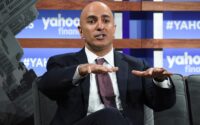Gautam Adani facing another setback as key index probes free float of stocks
India’s Adani Group faced fresh concerns on Thursday after financial index provider MSCI said it was reviewing the free float designation of some group company securities.
Billionaire Gautam Adani has seen some $110 billion wiped off the value of seven firms in the group he founded after US short seller Hindenburg Research accused the group of improper use of offshore tax havens and stock manipulation.
The Adani Group has denied any wrongdoing.
Analysts say a change in free float status could affect the weightings of MSCI index constituents, possibly triggering a shift of positions by funds as many investments globally are aligned to such indexes.
“Some investors follow MSCI index as a gauge,” said Neeraj Dewan, director at Quantum Securities. “Depending on the outcome of the MSCI review, we could see more pressure on select Adani group stocks.”
The world’s largest stock investor, Norway’s sovereign wealth fund, said on Thursday it had sold out of the Adani Group since the start of the year, unloading stakes in three firms worth just over $200 million.

India’s opposition parties on Thursday heckled Prime Minister Narendra Modi as he spoke in the upper house of parliament and demanded an investigation into the allegations against the Adani Group.
Modi, pointing to opposition leaders, said: “No matter how much mud you sling, the lotus will keep blooming,” referring to his party’s poll symbol, the lotus flower.
Uncertainty over free float
“MSCI has determined that the characteristics of certain investors have sufficient uncertainty that they should no longer be designated as free float,” US-based MSCI said in a statement.
“This determination has triggered a free float review of the Adani Group securities.”
Adani Group did not respond to a Reuters request for comment.
Changes for Adani securities associated with its MSCI Global Investable Market Indexes are due to be announced later on Thursday as part of MSCI’s regular review for February.
Free float is defined as the proportion of outstanding shares considered available for purchase in public equity markets by international investors.
In response to the MSCI statement, Hindenburg Research founder Nathan Anderson wrote on Twitter: “We view this as validation of our findings.”
Some Adani company shares had been rebounding this week but tumbled again on Thursday after the MSCI announcement. Adani Enterprises sank 11%, after losing as much as 20% in early morning trade.
Adani Transmission , Adani Total Gas and Adani Power were each down 5%, while Adani Ports and Special Economic Zone were down nearly 3%.
“The sentiment is affected by the MSCI announcement. It will lead to outflows if MSCI removes certain stocks,” said Ambareesh Baliga, a Mumbai-based independent market analyst.

The MSCI announcement marks the latest setback for Adani. His flagship Adani Enterprises was forced to abandon a $2.5 billion stock offering due to the market rout.
Indian opposition parties see the affair as an opportunity to corner Prime Minister Modi, who is eyeing a third term in elections next year. They accuse his government of giving undue favors to the Adani Group, a charge denied by the government and the company.
Sporadic protests have taken place in parts of the country as opposition parties demand investigations.
Meanwhile, tax authorities in the northern state of Himachal Pradesh inspected facilities of Adani Wilmar, the conglomerate’s consumer goods unit, over possible tax evasion, G.D. Thakur, a state official, told Reuters on Thursday.
“The tax authorities will ascertain the company’s claims and check if there is any tax evasion,” Thakur said.
Adani Wilmar did not immediately respond to a Reuters request for comment.
India’s markets regulator, the Securities and Exchange Board of India, is investigating the market rout in Adani Group shares, a person with direct knowledge of the matter told Reuters this week.
Moody’s rating firm has warned the share price declines could hit the group’s ability to raise capital, while India’s central bank is checking on lenders’ exposure.


